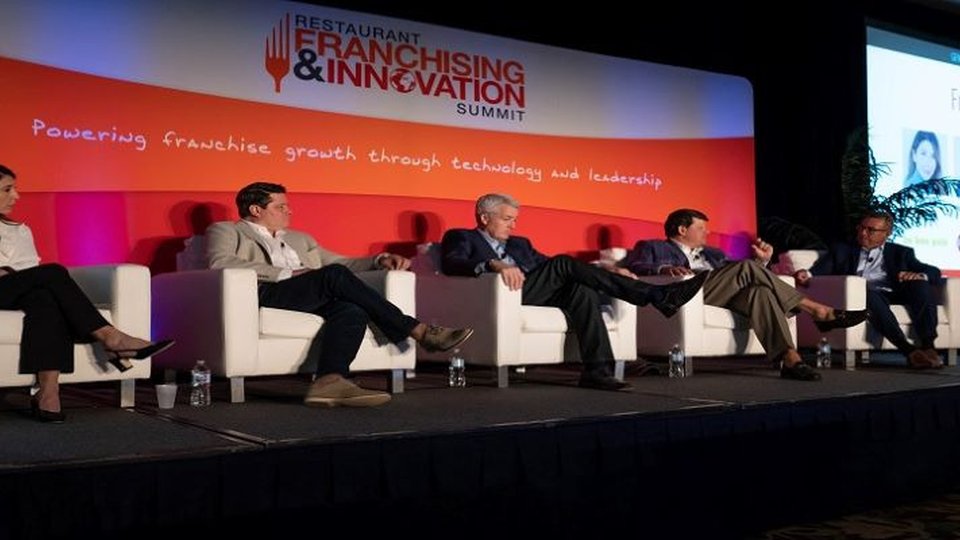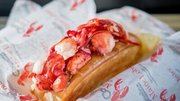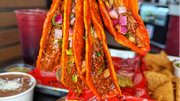Independent Operators
Franchise experts share insight, best practices for success
Four franchise industry leaders shared tips, insight and best practices for achieving success as a franchise and franchisee at the 2021 Restaurant Franchising and Innovation Summit held in Atlanta.

September 27, 2021
Restaurant franchising can be lucrative and rewarding but success doesn't come without a great deal of work, deep strategy and a consistent ability to wrestle with unforeseen challenges.
One such challenge is the ongoing COVID-19 pandemic, which prompted every brand to pivot quick in early 2020, develop digital customer engagement strategies, keep the franchise and its franchisees on the same path and delve deep into technology.
Now, just over a year since the coronavirus shuttered brick-and-mortar stores, the restaurant industry is once again open for indoor dining, but challenges remain now as the Delta variant has consumers anxious again about venturing out and municipalities grappling with mask mandates for indoor activities.
How to deal with those challenges, as well as all the typical hurdles in franchising — from helping franchises be successful to keeping up with all the necessary technology required for the digital revenue channels — was the focus of a panel session, "Franchising Think Tank," at the Restaurant Franchising and Innovation Summit.
The event, sponsored by Networld Media Group, was held last week in Atlanta. It is one of several foodservice and technology industry events run by Networld Media Group. The Fast Casual Executive Summit will take place Oct.3-5 in Charlotte, North Carolina and a virtual event, #QSRNext, will take place Nov. 9.
The panel was moderated by Mark Wayne, chief revenue officer at Viking Cloud, which sponsored the talk. Panel participants included Ericka Garza, brand president at Au Bon Pain; Joe Guith, president, restaurant category for Focus Brands; Ricky Richardson, CEO of Eggs Up Grill and Charles Watson, CEO of Tropical Smoothie Café
The ongoing COVID-19 business environment, given the Delta variant, has proved that the fast casual franchise industry is resilient and, in most circumstances, thriving due to acceleration of digital technologies for pickup, curbside pick and delivery.
"All brands have done well and survived and thrived and there has been a lot of positive economic impacts," said Wayne, "but then there are labor challenges. Are we in a steady state now? Are we out of the woods or not?" he asked the four panelists.
Noting he just had recently met with his team regarding the potential in play for a second shutdown scenario, Tropical Smoothie Café's CEO said it's been all about being ready to pull the lever tomorrow, next week, whenever it may be.
"We're staying on top of it as best we can, said Watson. "But here is what's interesting — we were to go back into lockdown and it's a whole different playing field," he noted. For example, today steakhouse icon Ruth Chris is doing 25% in takeout business, a phenomenon never in its history.
"You know it's a different playing field when Outback Steakhouse is doing 35% takeout," he said, and survival is obviously knowing what you're going to do [in a shutdown situation]," he said.
"I'm more concerned about how we keep what we've got — the lessons learned and the acceleration of our business. We're in a place that no one has ever been," he said, sharing 78% of growth for his brand over the past 18 months is due to digital channels.
"We have to retain it or we're in trouble. It isn't going all the way back [pre March 2020] as the convenience piece is too important but what does the new normal look like? We shall see."
At Eggs Up Grill the COVID-19 impact has accelerated a lot of trends that were already taking place in the consumer marketplace, said CEO Richardson.
"First off we had no to little technology inside our restaurants [prior to COVID] and just a few franchisees even did third party delivery. We went from that to 25% of sales in the digital channel within a 120-day period and we're really staying focused on the quality of execution in those channels."
While brands have been busy revamping, creating and innovating in the COVID-19 world, they're also simultaneously striving to keep the brand growing, and the challenge to find the right franchisee and partner to make remains as critical today as in pre-coronavirus days.
The art of recruiting franchisees
Within Eggs Up Grill many franchisees are single unit owners with a small population of multi-unit operators and most have not come from the restaurant world. Richardson said the franchise starts with a common selling point and theme focused on the uniqueness of the brand, which is now 24 years old.
"We've only closed one store in its history. So, we sell the success of the brand and a clear understanding of what has made it successful. We really hang our hat on welcoming everyone into our restaurant and building our whole experience around that and our brand is very approachable. It's a very down to earth concept and our level of affordability is also a very important part," he said.
"We stress how we will set them up for success. For the more sophisticated franchise partners we really want to stress the uniqueness of positioning, the economic opportunity. We wrap up both of those selling messages with our commitment as an ownership group and as a leadership team to the franchisee's success."
In terms of potential franchisees, the pool has gotten younger in age, said Watson, as well as a bit more entrepreneurial in spirit. One big change that is helping in recruiting is that the industry has become much more transparent to potential franchisees.
"Over past 10-15 years the availability of information and, quite honestly the industry of franchising, is more open to sharing information. If you shuck and jive with people, you're just creating your own problem," he said.
Wayne, who moderated the one-hour talk, then asked panelists about how they plan to grab the incremental $100 billion in fast casual market share being created through digital revenue streams in the next three years.
The battle for digital sales
Focus Brands' leader Guith said that while much has changed over the past years, it's more that many trends have just been amplified, citing the move to off-premises and adoption of digital.
"It's always been there. It just got accelerated by a good five years. Fortunately for us, with McAlisters [a Focus Brand brand] we had just launched a digital platform, so we benefited a lot. We were on premise and became an off-premise concept and even today we're running significantly higher than we were in 2019 but we're not done," he said, adding 65% of customers are coming more often because of mobile app table service. "So, between building those platforms and then building the loyalty that's going to be critical — it will be the difference between who survives and who doesn't over the next 10 years.
Watson said he's told his franchisees that if they don't want to get on third-party delivery then they don't want to be in business anymore.
"This is business, and this is how the consumer wants to transact. The arms race is here [digital, one-to-one relationship, the infrastructure, data setup and the POS] and you have to do all that stuff first and what we're really focused on in 2021 is getting the back-office systems, the POS systems, and the data flowing back correctly. We are leaning into it; we're putting one foot in front of the other to do the next right thing."
Looking ahead, he believes voice channels, where a consumer can use an IoT device such as Amazon's Alexa to place an order, is what's big on the horizon.
"It's a bold new frontier and the way I look at it, and this is goofy so stick with me, is what I call hospitalogy. I sell wraps, flatbreads and smoothies. I'm in the restaurant business and we're supposed to provide hospitality and here comes technology and how do I marry these two — beauty and beast together. I call it hospitalogy because many of our orders are starting in a digital way," he said.
Today the guest journey may start digital but the "ending" could be in a few places, such as curbside pickup, a walk-in pickup or even just walking into the store and placing an order on a phone or the POS.
"So, it's the different channels and that is what we're focused on. Remember the old James Carville line, 'it's the economy stupid,' well, 'it's still the guest, it's still the consumer stupid,'" he said.
Success, he added, lies in identifying the hospitality in each channel in play.
"It might not look like anything of hospitality we're used to; it could be the consumer saying 'don't talk to me, don't look at me, I want my product, I don't want to talk to anyone.' It's going to be fun to see what happens."
Shifting guest preferences, expectations
The new dining normal is people, format and technology.
At Au Bon Pain, according to Garza, that translates to accommodating guests, whether they're Gen Z and millennials who want convenience and using third-party services or the commuter who wants their order to go but also wants the interaction with the employee.
"For us it's trying to find that balance and that challenge from universities to different areas where people want that human interaction," she said.
At Eggs UP Grill the new normal is very new as the brand had less than 5% of revenue outside of its four-wall stores before COVID-19. Now that figure is up to 20%.
"Strategically you can't lose sight about what is it about your brand and about your experience whether inside the four walls or through these new channels. What is it that's unique about your experience and it just can't be price. We want to make sure at our early stage of growth not to forget who we are and forget what's unique about us in the minds of our guests so that we don't run for a short term benefit that ends up distracting us from the bigger opportunity we have."
Watson's view is that it's incumbent for brands and franchisees to have the all-important digital guest journey mirror the café or restaurant experience.
"It's a little more than look and feel, it's what is the voice of the brand and how does that come across digitally, how does that come across in voice? These are things that we need to figure out right because that guest journey is going to start there and it better match to some degree the in-restaurant experience."
 ChatGPT
ChatGPT Grok
Grok Perplexity
Perplexity Claude
Claude





